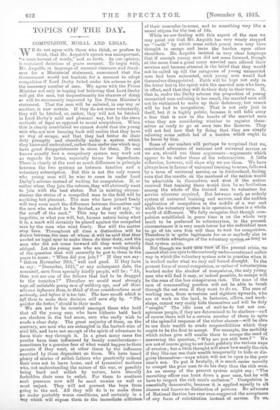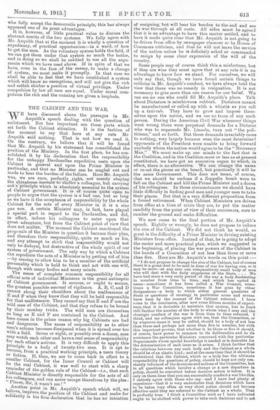TOPICS OF THE DAY.
COMPULSION, MORAL AND LEGAL.
WE do not agree with those who think, or profess to think, that Mr. Asquith's speech was unimportant, "a mere torrent of words," aud. so forth. • In our opinion, it contained decisions of grave moment. To begin with, Mr. Asquith, in language of unusual clearness and frank- ness for a Ministerial statement, announced that the Government would not hesitate for a moment to adopt compulsion if Lord Derby failed .under his scheme to get the necessary number of men. We agree with the Prime Minister not only in hoping but believing that Lord Derby will get the men, but unquestionably his chances of doing so will be enormously improved by the Prime Minister's statement. That the men will be enlisted, in one way or another, is now certain. If they do not come voluntarily, they will be fetched, or, rather, they will not be fetched in Lord Derby's mild and pleasant way, but by the stern methods of legal as opposed to moral compulsion. When this is clearly established we cannot doubt that the young men who are now hanging back will realize that they have no way of escape, and that they had better do their duty promptly aud cheerfully under a system which they know and understand, rather than under one which may have great disappointments in store for them. No one knows exactly how a compulsory system may work out as regards its terms, especially terms for dependants. There is clearly at the root as much difference in principle between the two systems as between taxation and a voluntary subscription. But this is not the only reason why young men will be wise to come in under Lord Derby's scheme instead of waiting for compulsion. If, or rather when, they join the colours, they, will obviously want to join with the best status. But in existing circum- stances the status of a compelled man in the field will be anything but pleasant. Tho men who have joined freely will very soon mark the difference between themselves and the men who waited to be fetched, as they will say, " by the scruff of the neck." This may be very unfair, or impolitic, or what you will, but, human nature being what it is, a mark will certainly be placed against the compelled man by the man who went freely. Nor will the matter stop here. Throughout all time a distinction will be drawn between the men of whom it will be said that they needed no legal spur to make them do their duty, and the men who did not come forward till they were actually obliged. Let the young men who are now waiting think of the question that will assuredly be put to them in the years to come : When did you join P" If they can say : " Before November 30th," well and good. If they have to say : " December, 1915," or any subsequent. date, the comment, save from specially kindly people, will be "Ah, then you are one of the fellows that had to be dragged to the trenches l" Therefore we would most strongly urge all enliitable young men of military age, and all those who can influence them, to think of these considerations most seriously, and before it is too late. The bare month which is left them to make their decision will soon slip by. " The quicker the better," shoild be their motto. We are not to be counted amongst those who hold that all the young men who have hitherto held back are slackers iii the bad sense, men who really wish to evade a clear duty. The great majority of them, on the contrary, are men who are entangled in the barbed-wire of civil life, and have not enough of the spirit of adventure to force their way through it. In a great many cases the youths have been influenced by family considerations— sometimes by a genuine fear of what would happen to their parents if they went, at other times by the influence exercised by those dependent on them. We have heard plenty of stories of selfish fathers who practically ordered their sons not to leave home, and of tyrannical mothers who, not understanding the nature of the war, or possibly being bard and selfish by nature, have literally forbidden their sons to enlist. For them to continue such pressure now will be most unwise as well as most unjust. They will not prevent the boys from going in the end. All they will do is to make them go under probably worse conditions, and certainly in a way which will expose them to the immediate criticism. of their comrades-in-arms, and to something very like a moral stigma for the rest of life.
While we are dealing with this aspect of the case we may point out that Mr. Asquith has very wisely stopped an "earth" •by which some selfish young men may have thought to escape and leave the burden upon other shoulders. Mr. Asquith insisted in very clear language that if enough young men did not come forward, though at the same time a great many married men offered their services and became attested in the, belief that they would not be called up till the categories of young unmarried men had been exhausted, such young men would find themselves disappointed. Faith will be kept not only in the letter but in the spirit with the married men who have, in effect, said thatthey will do their duty in their turn. If, that is, under the Derby scheme the proportion of young unmarried men enlisting is too small, the married men will not be victimized to make up their deficiency, but resort will be had to compulsion. That is not only just in itself, but it is highly politic, because it will take away a fear that is now in the hearts of the married men when they are considering whether to register them- selves as ready to go at once into the Reserve. They will not feel now that by doing that they are simply relieving some ,selfish lad of a letirden which ought to be borne by him. • Some of our readers will perhaps be surprised that we, convinced advocates of national and universal service as we are, should use these arguments—arguments which appear to bo rather those of the voluntaryists. A little reflection, however, will show why we use them. We have always been in favour of universal training to arms, followed by a term of universal service, as in Switzerland, feeling sure that the results on the manhood of the nation would be. admirable in themselves, and that if the nation received that training there would then be no hesitation among the whole of the trained men to volunteer for service wherever required. But between such an orderly system of universal training and service, and the sudden application of compulsion in the middle of a war and while the voluntary system is in operation, there is a whole world of difference. We fully recognize that though com- pulsion established in peace time is on the whole very much to be preferred to voluntaryism, in the present circumstances it is very much better for the individual man to go of his own free will than to wait for compulsion. Therefore it is quite legitimate for us or anybody else to urge certain advantages of the voluntary system as long as that system exists. But though we hold this view.of the, present crisis, we cannot abut our eyes to the curiously undemocratic and unfair way in which the voluntary system acts in practice when it is worked under what we may call forced draught. In the present form of moral compulsion, or rather of voluntaryism worked under the shadow of compulsion, the only young men who will find it easy, or indeed possible, to escape will be the sons of the less conspicuous rich. The eons of the men of commanding position will not be able to break through the net even if they want to do so. The sous of working men, from seventeen and eighteen upwards, who are at work on the land, in factories, offices, and work- shops, cannot very easily hide themselves and will be duly " caught." The idle sons of well-to-do but not con- spicuous people, if they are determined to be slackers—and of course there will be a certain number of these in spite of the splendid response of the richer classes—will be able to use their wealth to evade responsibilities which they ought to be the first to accept. For example, the mobility which riches give will enable them to escape the need of answering the question, '.' Why are you still here ? " We are not of course going to set forth publicly the various ways of evasion; but a little thought will show how easily the rich if they like can use their wealth temporarily to hide or dis- guise themselves—ways which will not be open to the poor man's son. To put it brutally, it is much easier morally to compel the poor man to do his duty than the rich man. As an enemy of the present system might say : "The recruiting officer can hunt down a poor man, but he will have to respect the rich man's seclusion." Compulsion is essentially democratic, because it is applied equally to all classes and knows no distinction of persons. No advocate of National Service has ever even suggested the acceptance • of any form of substitution instead of service. To us,. who fully accept the democratic principle; this has always appeared one of its great advantages. It is, however, of little practical value to discuss the abstract merits of the two systems. We fully agree with Mr. Asquith that at the moment it is wholly a question of expediency, of practical opportunism—in a word, of how to get the men. As the voluntary system holds the field, if we can get them under that system so much the better, and in doing so we shall be entitled to use all the argu- ments which we have used above. If in spite of that we have, even in the face of the enemy, to make a change of system, we must make it promptly. In that case we shall be able to feel that we have established a system which will know no exemptions, and will not give the rich and selfish shirker a position of virtual privilege. Under compulsion by law all men are equal. Under moral com- pulsion the rich and the cunning are given a loophole.

















































 Previous page
Previous page